We may not have the course you’re looking for. If you enquire or give us a call on +918037244591 and speak to our training experts, we may still be able to help with your training requirements.
We ensure quality, budget-alignment, and timely delivery by our expert instructors.
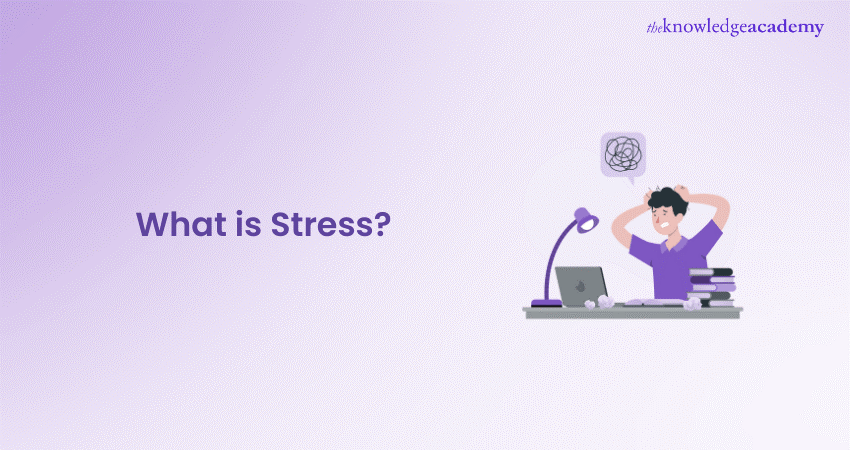
Feeling jittery before a big interview, a test, or a pivotal life-changing decision is totally expected. This results in stress—it’s that unwelcome guest that shows up at the worst times, whether from looming deadlines, unexpected road bumps, or the daily life’s chaos. While it's a natural response to life’s challenges, when unmanaged, it can take a toll on one's mental and physical health. If you seek guidance on taming this inner turmoil, this blog will guide you through it all by exploring What is Stress in detail, including its types and the tips for managing it. So read on, take charge and stress less!
Table of Contents
1) What is Stress?
2) Symptoms and Causes
3) Roots of Stress
4) Types of Stress
5) Stress Management Tips
6) Who is Affected by Stress?
7) Stress Vs Anxiety: What's the Difference?
8) Management and Treatment
9) Conclusion
What is Stress?
Stress is your body’s way of responding to any demand or threat. When presented with a situation where you feel threatened, your nervous system reacts by releasing a flood of stress hormones. These include Adrenaline and Cortisol, which alert the body for emergency action. It’s a natural reaction that can help you stay wary and focused. However, it can become problematic when it’s constant or overwhelming.
Symptoms and Causes
Let's explore the symptoms and causes of stress. The following table summarises the three kinds of symptoms:
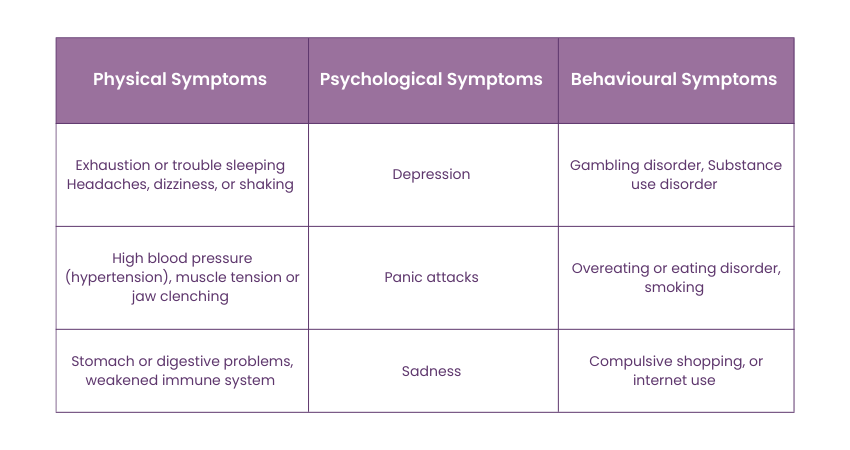
There are numerous causes of stress. While many different things result in stress, stressors can be positive or negative. Common causes of stress include:
1) An illness or death of a loved one.
2) Marriage, separation or divorce.
3) Retirement
4) Financial issues.
5) Moving to a new house or location.
6) Going on vacation.
Having a baby. There are short-term causes of stress as well, such as studying for a big test, getting ready for a work presentation or arguing with a friend or loved one.
Master the principles of well-being in our detailed Positive Psychology Training - Sign up now!
Roots of Stress
Determining the root cause of stress may be challenging, but here are the most common places stress can originate from:
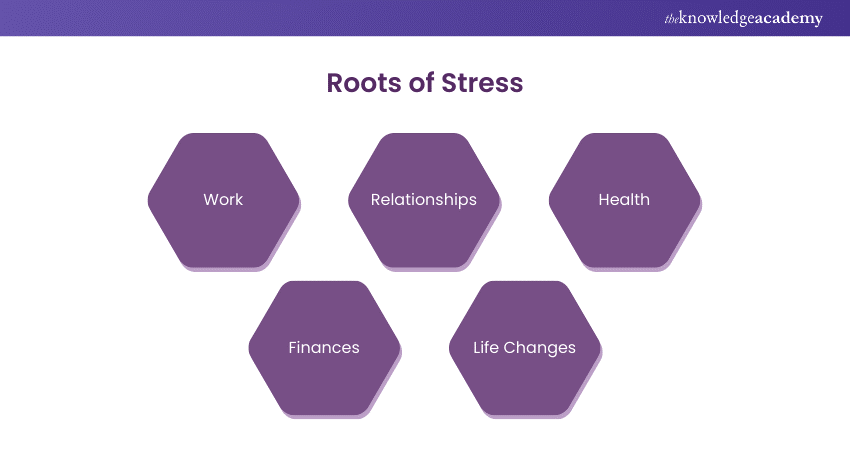
a) Work: The most common cause of stress in adults, are the high demands, tight deadlines, or job insecurity that come with their profession.
b) Relationships: Conflicts between the ones you love, lack of support, or communication issues are also very common reasons to be stressed.
c) Health: Suffering from chronic illness, injury, or concerns about well-being can cause you significant amounts of stress.
d) Finances: Owing someone money, unexpected expenses, or the economic uncertainties, may cause you to feel stressed about staying afloat.
e) Life Changes: Major life changes live moving localities, changing jobs, or the loss of a loved one can be stress bearing events on your life.
Learn how to deal with stress in the workplace in our comprehensive Stress Management Course - Sign up now!
Types of Stress
Depending on how it affects you, it is categorised into two major types, positive and negative. Here we explore seven key types of stress that affect people of varying lifestyles or age groups:
Acute Stress
Acute stress is the most common form of stress. It can be beneficial in short bursts because it's the body's natural reaction to an upcoming challenge or an unexpected situation. Typical symptoms of acute stress include:
a) Muscle tension
b) Headache or jaw ache
c) Emotional distress
d) Rapid heartbeat
e) Stomach upset
f) Raised blood pressure
Chronic Stress
a) Chronic stress results from prolonged emotional pressure, such as a stressful job, an unhappy family situation, or financial difficulties.
b) Frequent activation of the fight-or-flight response prevents the body from recovering. This keeps the nervous system in a constant state of stress.
c) If untreated, chronic stress can lead to physical health issues, including heart disease and a weakened immune system.
d) While the cause of chronic stress may be unavoidable, managing its effects on health is possible.
e) Consulting a doctor can help identify strategies to cope with stressors and symptoms.
f) Managing chronic stress effectively reduces its impact on physical health.
Episodic Acute Stress
a) Episodic acute stress occurs when acute stress happens frequently.
b) It can create a constant feeling of pressure or a sense that things are always going wrong.
c) This type of stress can be exhausting both mentally and physically.
d) It may impact interactions with others, leading to irritability, hostility, and relationship problems.
e) Addressing episodic acute stress will require lifestyle changes.
f) Consulting a doctor can help identify effective Stress Management strategies.
Emotional Stress
a) Emotional stress stems from personal or interpersonal relationships.
b) It can be triggered by events such as the loss of a loved one or a breakup.
c) Common effects include feelings of sadness, anxiety, and depression.
d) Managing emotional stress may involve seeking support from friends, family, or Mental Health professionals.
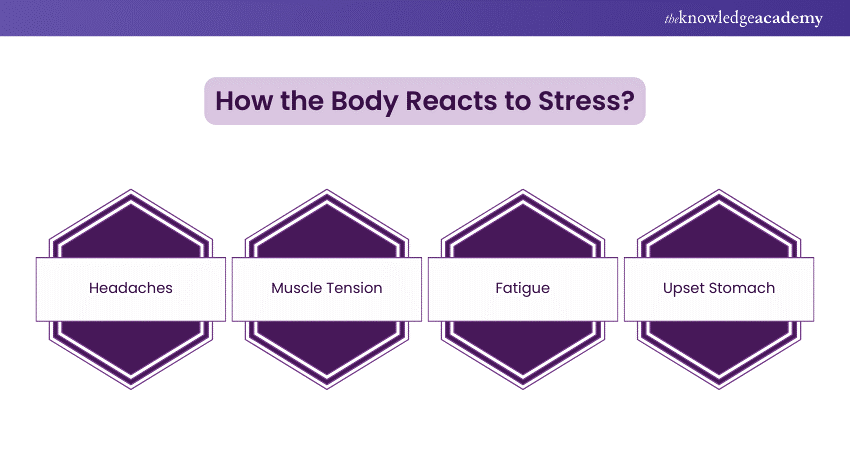
Physical Stress
a) Physical stress occurs due to strain on the body.
b) Causes include injury, illness, overexertion, or lack of sleep.
c) Symptoms can include fatigue, muscle tension, and a weakened immune system.
d) Managing physical stress requires a balanced lifestyle with regular exercise, sufficient rest, and a healthy diet.
Environmental Stress
a) Environmental stress stems from external surroundings.
b) Common causes include noise pollution, poor air quality, overcrowding, and extreme weather conditions.
c) Some environmental stressors may be beyond your control.
d) Reducing exposure and creating a more comfortable living and working environment is the best way to manage this stress.
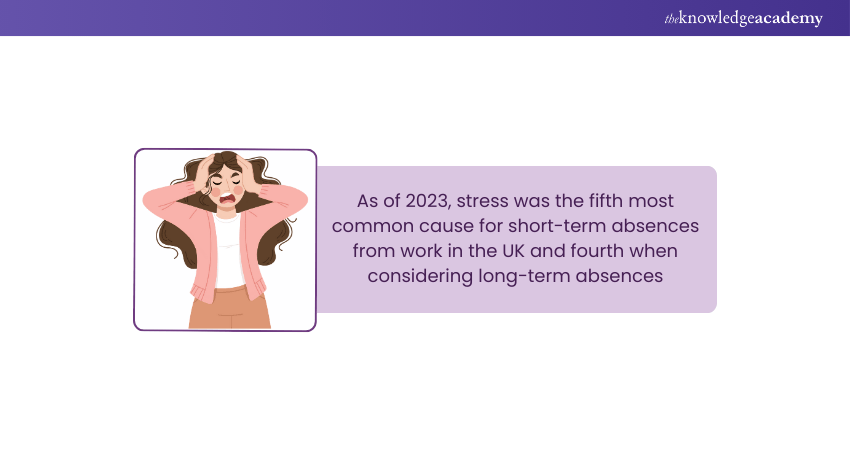
Psychological Stress
a) Psychological stress stems from cognitive factors such as perception, thoughts, and attitudes.
b) Triggers include internal pressures, unrealistic personal or professional expectations, and negative self-talk.
c) It can lead to feelings of inadequacy and low self-esteem.
d) Effective management strategies include cognitive-behavioural techniques, mindfulness, and relaxation exercises.
Learn how you can prevent psychological distress that can lead to extreme adversities - sign up for our Prevention Psychology Training now!
Stress Management Tips
Managing stress involves adopting habits and techniques that help you maintain balance and well-being.
Try Self-help Techniques
Try to engage yourself with activities that help you relax, such as reading, meditating, or listening to music. Find what works best for you and make it a regular part of your routine.
Try Positive Thinking
Reframe your negative thoughts and focus on a more positive outcome. Practising gratitude and keeping a journal can help shift your mindset.
Talk to Someone
Share your feelings with your trusted friends, family members, or therapist. Talking can provide relief and offer new perspectives on your problems.
Split up Big Tasks
Break large projects into smaller, manageable steps. This can make them seem less overwhelming and more accessible to tackle.
Be More Active
Regular physical activity can help regulate your stress hormones. Staying active can also trigger the release of endorphins, which are natural mood boosters.
Plan Ahead
Organise your time and prioritise tasks. Having a clear plan can reduce the Stress of last-minute rushes and unexpected challenges.
Aid in creating a safe space for everyone around you with our Mindfulness Training - sign up now!
Who is Affected by Stress?
Stress doesn’t discriminate. It affects everyone, regardless of their age, gender, or background. As highlighted in the Stress Management Guide, students, working professionals, parents, and retirees – everyone can experience stress in different ways. Each individual’s stress response is unique and influenced by their personality, upbringing, and life circumstances.
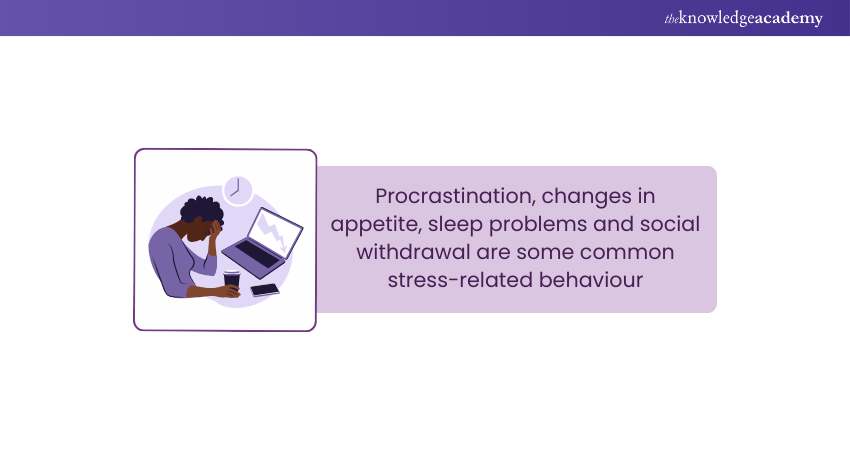
Stress Vs Anxiety: What's the Difference?
Stress is generally a response to an external trigger, such as a deadline or a challenging situation, typically short-term and resolves once the situation is addressed. Meanwhile anxiety is a continuous state of fear or worry about future events and may occur without a specific stressor.
Management and Treatment
While stress can't be predicted, daily stress-relief strategies can help keep it from becoming overwhelming:
1) When stress arises, engage in physical activity, such as a short walk.
2) Focus on what you accomplished rather than what was left undone.
3) Break tasks into daily, weekly, and monthly goals.
4) Talk to a Therapist or Healthcare Provider.
Conclusion
While it's a natural part of life, understanding What is Stress, its types, symptoms, and management techniques can help you stay in control. You can significantly reduce its impact by recognising the various triggers, embracing healthy coping strategies, and seeking much-needed support. As outlined in this blog, it's about taking charge of stress (not the other way round), prioritising well-being, and creating a more balanced life.
Learn to manage stress mindfully and build resilience with our Handle Stress and Develop Your Resilience Training - register now!
Frequently Asked Questions
How can I Tell if I’m Stressed?

Recognising stress can be tricky, but common signs include feeling anxious, irritable, or overwhelmed. Physical symptoms like headaches, muscle tension, and fatigue are also indicators.
What to Reduce Stress Quickly?

Quick stress-relief techniques include deep breathing, taking a short walk, or practising mindfulness. Even a few minutes of these activities can help calm your mind and body.
What are the Other Resources and Offers Provided by The Knowledge Academy?

The Knowledge Academy takes global learning to new heights, offering over 3,000 online courses across 490+ locations in 190+ countries. This expansive reach ensures accessibility and convenience for learners worldwide.
Alongside our diverse Online Course Catalogue, encompassing 19 major categories, we go the extra mile by providing a plethora of free educational Online Resources like News updates, Blogs, videos, webinars, and interview questions. Tailoring learning experiences further, professionals can maximise value with customisable Course Bundles of TKA.
What is Knowledge Pass, and How Does it work?

The Knowledge Academy’s Knowledge Pass, a prepaid voucher, adds another layer of flexibility, allowing course bookings over a 12-month period. Join us on a journey where education knows no bounds.
What are Related Health & Safety Courses and Blogs Provided by The Knowledge Academy?

The Knowledge Academy offers various Health & Safety Courses, including Advance First-Aid Training, Active and Healthy Lifestyle Training, and Counselling Certifications. These courses cater to different skill levels, providing comprehensive insights into What is Anxiety.
Our Health & Safety Blogs cover a range of topics related to Panic and Anxiety Attacks, offering valuable resources, best practices, and industry insights. Whether you are a beginner or looking to advance your skills. The Knowledge Academy's diverse courses and informative blogs have you covered.
Upcoming Business Skills Resources Batches & Dates
Date
 Anxiety Courses
Anxiety Courses
Fri 20th Jun 2025
Fri 22nd Aug 2025
Fri 17th Oct 2025
Fri 19th Dec 2025






 Top Rated Course
Top Rated Course



 If you wish to make any changes to your course, please
If you wish to make any changes to your course, please


